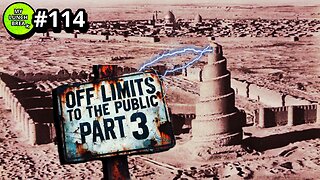Premium Only Content

The “afterlife” according to Einstein’s special relativity
Einstein's **special relativity** does not directly address or support the concept of the **afterlife**, as it is a scientific theory concerned with the nature of space, time, and the behavior of objects moving at high velocities. However, we can examine how **special relativity** relates to our understanding of life, death, and the passage of time, which might touch upon ideas around the afterlife.
### Key Principles of Special Relativity
1. **Time Dilation:**
- One of the core ideas in **special relativity** is **time dilation**, which states that time passes at different rates for observers in different frames of reference. For example, if someone travels at near-light speeds, time would appear to pass more slowly for them relative to someone who is stationary. This means, in theory, a person traveling close to the speed of light would experience what seems like a shorter passage of time, while much more time would pass for an observer at rest.
- **Implication for the Afterlife**: Time dilation doesn't imply life after death but instead illustrates how relative time works. A person who travels at relativistic speeds may experience "slower" time, but their consciousness doesn't continue after death. The concept of "life after death" doesn't align with the framework of special relativity, which is grounded in the physical reality of spacetime.
2. **Spacetime and the Block Universe Theory:**
- In the framework of **special relativity**, time and space are intertwined into a four-dimensional fabric known as **spacetime**. This concept leads to the idea of the **block universe**, which suggests that the past, present, and future all exist simultaneously as part of the spacetime continuum. Everything is fixed in time and space.
- **Implication for the Afterlife**: The block universe theory, while offering a different perspective on time, does not imply any survival of consciousness after death. It suggests that, from a physical standpoint, the future is as real as the past, but the "future" isn't a place you can "go" after death. Life and death are parts of the spacetime continuum, but there is no scientific framework in special relativity to support consciousness persisting after death.
3. **The Nature of Consciousness:**
- **Special relativity** does not provide insights into the nature of consciousness or whether it survives death. The theory focuses on how objects move through spacetime and how observers in different states of motion perceive time and events differently.
- **Implication for the Afterlife**: Special relativity doesn't address the metaphysical or philosophical questions about life after death or the continuation of consciousness. These questions fall into the realm of philosophy and religion, not physics.
### Sabine Hossenfelder's View on Afterlife
- **Sabine Hossenfelder**, a theoretical physicist, has critiqued many speculative ideas in theoretical physics, including the idea that quantum mechanics or relativity might provide a foundation for the afterlife. She often emphasizes the importance of distinguishing between testable scientific theories and metaphysical or speculative beliefs.
- According to Hossenfelder, there is no evidence in **special relativity** (or any established physical theory) to suggest that consciousness survives death or that an afterlife is a scientifically viable concept.
### Conclusion
While **Einstein’s special relativity** transforms our understanding of time, space, and motion, it does not provide any framework for the afterlife. Time dilation and the block universe theory offer intriguing perspectives on how time operates at different speeds or across the fabric of spacetime, but they do not suggest that consciousness continues after death. The concept of life after death remains outside the realm of empirical science and is instead explored through philosophical, religious, and metaphysical lenses.
-
 LIVE
LIVE
DLDAfterDark
1 hour agoDLD Live! SHTF Handguns! Which Would You Choose?
518 watching -
 1:50:38
1:50:38
Mally_Mouse
3 hours agoSaturday Shenanigans!! - Let's Play: Mario Party Jamboree
21.2K -
 1:13:00
1:13:00
Patriots With Grit
7 hours agoWill Americans Rise Up? | Jeff Calhoun
15.9K9 -
 14:55
14:55
Exploring With Nug
7 hours ago $6.61 earnedWe Found Semi Truck Containers While Searching for Missing Man!
36.6K6 -
 27:57
27:57
MYLUNCHBREAK CHANNEL PAGE
15 hours agoOff Limits to the Public - Pt 3
71.1K54 -
 38:07
38:07
Michael Franzese
8 hours agoLeaving Organized Crime and Uncovering Mob in Politics: Tudor Dixon and Michael Franzese
58.8K14 -
 2:42:54
2:42:54
Jewels Jones Live ®
2 days agoAMERICA IS BACK | A Political Rendezvous - Ep. 111
52.6K43 -
 8:47:33
8:47:33
Due Dissidence
1 day agoLIVE: Workers Strike Back Conference ft. Chris Hedges, Jill Stein, Kshama Sawant, and More!
97.7K55 -
 8:36:37
8:36:37
Right Side Broadcasting Network
5 days agoLIVE REPLAY: CPAC 2025 Day Three with President Donald J. Trump - 2/22/25
424K96 -
 1:05:34
1:05:34
The Big Mig™
16 hours agoConfirmed Kash Patel New FBI Director, Bring On The Pain |EP483
99K28